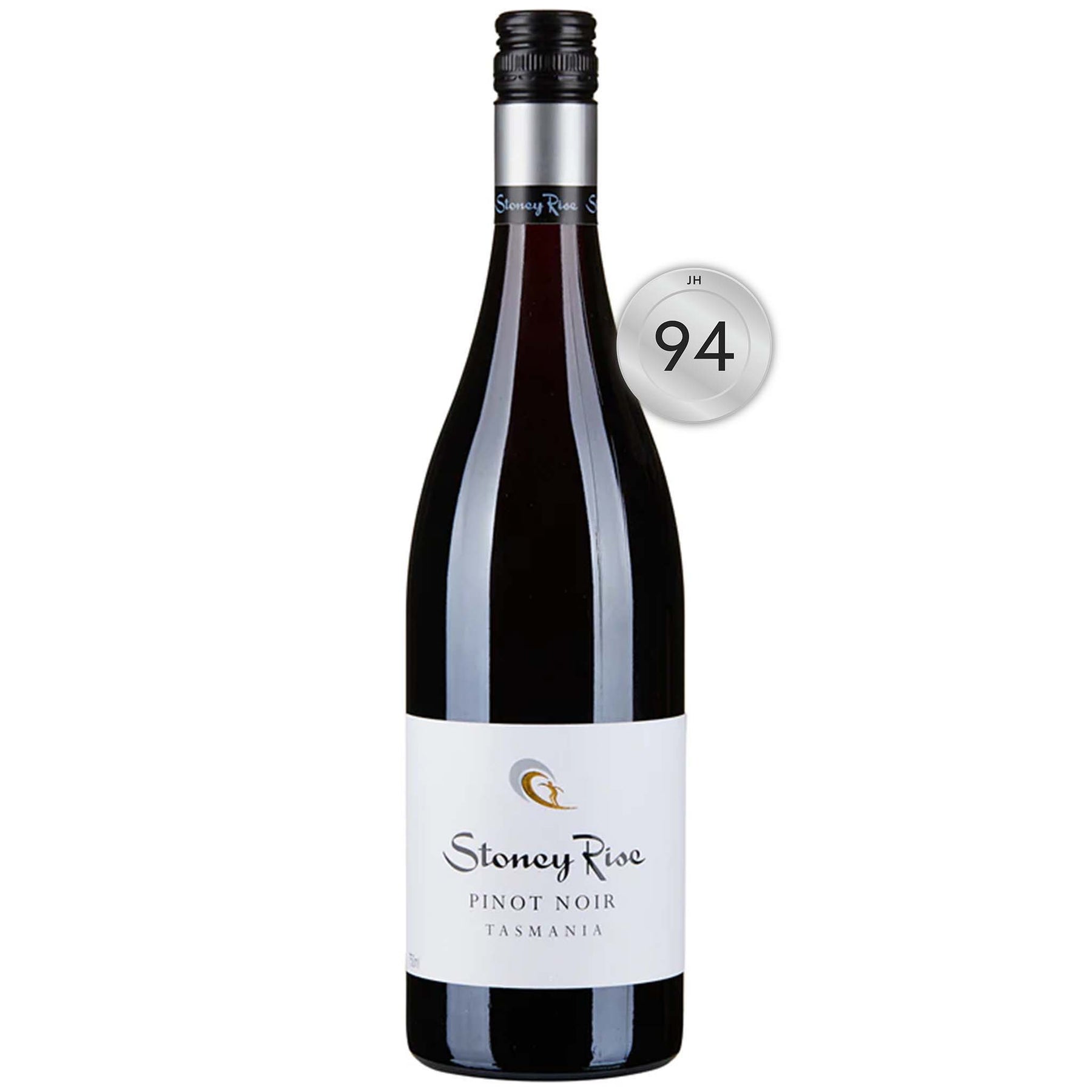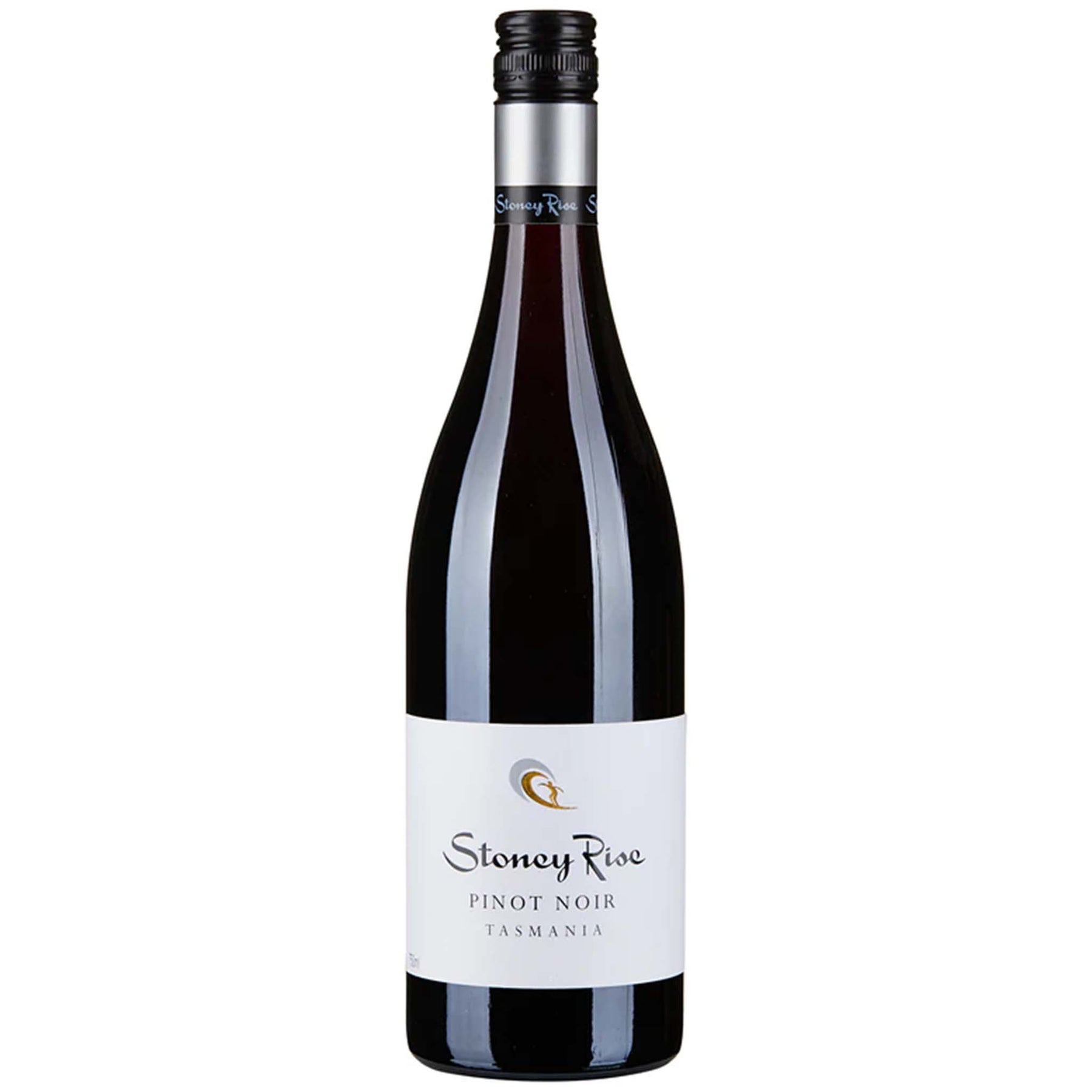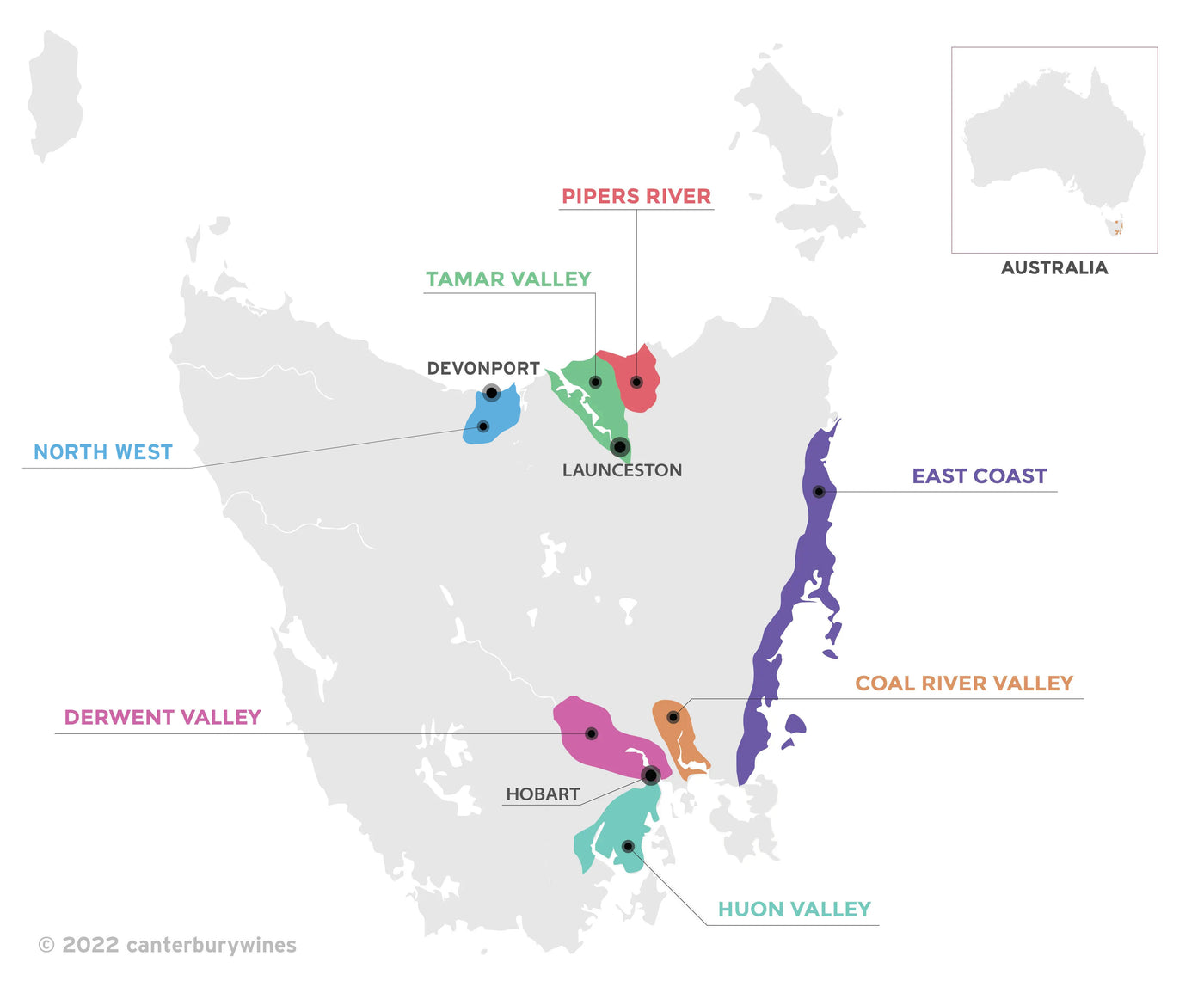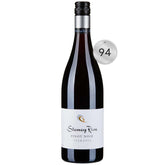

Stoney Rise Pinot Noir 2009
Style: Red Wine
Closure: Screwcap
Stoney Rise Pinot Noir 2009
Warehouse
34 Redland Drive
Vermont VIC 3133
Australia
Producer: Stoney Rise
Country: Australia
Region: Tasmania
Vintage: 2009
Critic Score: 94
Alcohol: 13.0%
Size: 750 ml
Drink by: Now
Stoney Rise, located in the heart of the Tamar Valley in Northern Tasmania, is a family-run winery owned by Joe and Lou Holyman. In 2004, the couple purchased the former Rotherhythe vineyard, which had been established in 1986, and restored it to its former glory. The vineyard is planted mainly to pinot noir and chardonnay, with small plantings of Trousseau and Grüner Veltliner.
"Has considerable depth to its multi-spice, plum and black cherry fruit on bouquet and palate alike; the fruit flavour pours along the palate to the very finish, guaranteeing its future. Harmonious." James Halliday
Expert reviews
"Excellent purple-crimson hue; has considerable depth to its multi-spice, plum and black cherry fruit on bouquet and palate alike; the fruit flavour pours along the palate to the very finish, guaranteeing its future. Harmonious. Drink by: 2019." James Halliday, Halliday Wine Companion - 94 points
"A very subtle and understated pinot noir that reveals more complexity with time in the glass: rhubarb, spice, dark cherries, mushroom, even a little floral complexity in an attractive, silky package. My bet is it will really blossom over the next six to eight years." Angus Hughson
About Joe Holyman

Humour, honesty and grapes that sing. Joe Holyman keeps things simple at Stoney Rise.
The view from Joe Holyman’s winery and cellar door is something special. At the end of the day, cold beer in hand, he looks out over 7.2 hectares of vineyards against a backdrop of north Tasmania’s Tamar River, 25 minutes north of Launceston. The vines are his happy place.
"It’s what I enjoy doing," he says. "The whole process of making sure the fruit we pick is the best fruit we can. Our philosophy has changed a bit over the years: we’re picking earlier and adding less, doing more in the vineyard so we have to add less to the wine. We don’t use herbicides, we don’t add anything other than sulphur. It’s about reducing. I’m looking at the vineyard now from our loungeroom and it’s 15 metres away. Lou and I have three young kids – we don’t need to be out there throwing chemicals around."
The winery has a five-star James Halliday rating but for Joe, it’s not about accolades. "It’s nice to have people recognise you but we’re not in the business for that. We don’t enter shows, we’re more interested in the customers we have already and building more. I guess personal endorsements and all that sort of stuff helps build customers but it’s really not why we’re here. We’re here to make the best wine we can."
Joe knows the area well. He grew up on on a little farm near Launceston where his father planted .6 hectares of hobby vineyards. His mother had a catering business and by day, his dad worked for a family transport business, moving wine out of South Australia across the country. "He was a good, honest businessman and figured he might as well start supporting the people who were supporting him," Joe says. "So he started buying wine from the wineries he was working with. He developed quite an extensive array of Australian wine from the late sixties into the mid-eighties."
Back then, Joe enjoyed the occasional sip but it was baggy whites that had his heart. "I finished school and had an agreement with my father that if I achieved what is now the HSC, I could go to England to play cricket." The flipside was that, after a year, he had to return and go to university. "I started studying a business degree and didn’t like that too much – I lasted about six weeks then moved back to play cricket."
During the nineties, Joe donned the whites for the Tassie Tigers in the Benson & Hedges Sheffield Shield. He’s in the record books for collecting seven catches on his debut against Western Australia on 7 March 1991. "A lot of the Test players used to play in Shield cricket a lot, so at the time you got to play against the best cricketers around Australia."
He ended up taking a marketing course at Roseworthy, initially studying externally. Jeremy Holmes, who now runs Barossa-based international wine business d’Or to Door Wines Direct, was influential during those early marketing years. "He taught me a lot and was the first person to give me a job out of Roseworthy. We still remain close and talk about stuff."
Joe cut his teeth working as a sales rep in Sydney and Melbourne for fine wine importer and distributor Negociants before taking a role with The Wine Society, buying wine for its 50,000 members. He worked in wineries across the globe and met wife Lou while working at Cape Jaffa Wines in Robe, South Australia. Lou has experience in South Australian vineyards, winery offices and cellar doors. She looks after the business side of Stoney Rise.
"I don’t think anyone would ever tell you it’s easy to run a vineyard and a family, living on the property and being here all the time with young kids. But it’s definitely great to have each other to talk to about the business. It’s a busy life we lead," Joe says.
Their Tasmanian winery is named after a South Australian surf spot. "A friend of mine, who was also working at Cape Jaffa, and I decided we would buy a couple of tonnes of fruit and make some wine, just for ourselves. We had a journalist visit one day and got an email from him about two weeks later saying, ‘I really like your shiraz, I’d like to put it in Vogue Entertainment, can you send me a bottle?’"
In a hurry, using Microsoft Clipart, they designed a label with a guy on a surf board. "We were buying fruit and using someone else’s winery and the only thing we could think of was that we were doing a lot of surfing in Robe at a place called Stoney Rise. That’s where it all came together."
Joe and Lou found their Tassie property in 2004. They were looking for potential winery sites when the urge for a wee hit. "We dropped into the cellar door and while Lou was on the toilet I was standing at the counter talking to the owner. He was commenting on what you could do to the place if you bought it. It never went on the market, so it was a bit serendipitous."
They purchased the property (originally named Rotherhythe Heights) on 1 June 2004 and the Stoney Rise name came with them.
"We used Stoney Rise because we had some brand presence on the market and knew if people drove past and saw Stoney Rise they’d think, ‘I’ve heard of that’ and drive up the driveway."
For the first three years they made wine offsite because they spent so much time in the vineyard. The original vines were planted in 1986, so they had vine age on their side but the property was in a state of disrepair. "The guy [we bought from] wasn’t from the industry and was the second owner, so I think he thought he was going to sit on the balcony, look at the river and drink chardonnay all day."
Twelve years down the track, Joe is still chipping away. "We’re getting there slowly. When we first got here there was about .8 of a hectare of cabernet planted that we pulled with a 20 tonne excavator and replaced with pinot. We lost nearly a quarter of the vineyard in one felll swoop but that’s all up and running now. There’s just over three hectares of the original planting, the original 4.2 hectares (3800 vines per hectare) are 30 years old this year."
In 2014 they planted three hectares at 4500 vines per hectare. "We are hoping to get some fruit off this vineyard this year. It is mainly a massale planting of pinot noir but we also have 1000 vines of trousseau in there." Joe believes there is room for about another 2.5 hectares of expansion. "We’d like to become an estate-grown business – it will give us more control over fruit quality rather than buying some fruit in for the Stoney Rise brand."
Joe’s approach to grape growing was influenced by his father’s friend Graham Wiltshire, who planted the Jansz vineyard (originally named after Tasman’s ship, the Heemskerk). "When we bought this property, he helped me out for a few years until he got a bit too old. He believed it was all about the quality of the fruit rather than what you do in the winery. So we still follow that sense."
Spur-pruned vines are treated individually in relation to the crop they carry (never have more than two bunches per shoot and any weaker vines have one bunch per shoot), averaging 4.5 tonnes per hectare. They don’t use herbicides, opting for minimal sprays and biodynamic preparations on the soil to increase vine health. The Stoney Rise range focuses on fruit and early drinkability, and the more structured range of Holyman wines have more potential for longevity.
"Winemaking to me is like cooking. If you start with nice ingredients, the food always tastes better. We are very honest in our appraisal here that we spend 95 percent of our time in the vineyard and five percent in the winery. In all honesty, part of me couldn’t care – I’d almost be happy to have a winemaker make the wine and do that process for me. We don’t add anything to the wine except sulphur so it’s a pure fermentation process."
The construction of the winery in 2008 was relatively straight forward. "My father had most of the equipment we needed, so we had a de-stemmer, a press and a few little tanks. It’s a very basic Colorbond shed with a little bit of equipment in it. We’re very basic here. We don’t have heating or cooling in the winery, we don’t have a lab because I don’t understand science because I’m not a winemaker. Dad had .8 of a hectare and we’re still using that equipment. We buy fruit in as well so we’re doing a lot more. We were lucky to be in a position where he over-supplied on the equipment he purchased for the original bit of wine he was doing."
What does Joe love most about the industry? "I love that it’s a small industry. I like the camaraderie and people always being willing to help. We’re all good at recommending each other and working well together." He pauses. "I used to tell people I got into the wine industry because it was the only job I could find where it was okay to go to work with a hangover."
In 2015, Stoney Rise bagged Gourmet Traveller’s Best Small Cellar Door award. Joe believes a good cellar door needs honest people with knowledge and understanding of the products. Unusually, they charge for tastings. "If people aren’t willing to spend five dollars to taste seven wines, they’re not going to spend $50 on a bottle of pinot. You can’t go to a restaurant and taste seven dishes before you decide if you want to buy any of them."
He says the response is mixed. "You get the people who drive up in fancy cars and scoff at paying five dollars for a tasting, then you get someone who doesn’t look like they’re going to buy a bottle but when you say there’s a tasting fee they say, ‘That’s so good because I don’t feel pressured to buy something.’ We’re not super strict on it. It’s a way of sorting out who is in your cellar door."
When questioned about mistakes, Joe is thoughtful. "One of them was not being independently wealthy when I started working in the vineyard. The other was getting to know Mike Bennie and Nick Ryan. They’re terrible." He laughs.
They are, in fact, mates. Joe recently joined forces with Mike and Peter Dredge for tongue-in-cheek wine label Brian. They keep it on the down-low but the Instagram account (@brian_wine) is a hoot. "That’s pretty much what Brian is about. I’ve known Mike since I was in Sydney. We came across some fruit a few years ago, when Mike was getting into skin contact winemaking, and we decided that’s what we’d do with this fruit."
If he could change one thing about the Australian wine industry, Joe would make people more honest. "In terms of the stories they tell surrounding their vineyard practices. There’s plenty of people out there who don’t care about how grapes are grown and there are lots who do. It’s something people need to be honest about. We don’t use pesticides but I have a bank manager and a young family. If we have another 2011, then I’ll spray the vineyard with chemicals to make sure we can pick grapes. If I don’t have to spray, I won’t."
The future is about consolidating what they do. "We’re trying to make less wines, not more. We make seven and could probably reduce that to six." He pauses. "Everything I know about a vineyard is based on my vineyard, not anyone else’s. The objective for me is to make the best wine from my vineyard, not to make a wine that tastes like anyone else’s. It’s about doing what we do properly, rather than continually reinventing ourselves. I think sometimes if you reinvent yourself too often you forget where you started."
The above article by Katie Spain appeared in Wine Business Magazine (WBM) in Jan 2017
About the winery

The Stoney Rise Wine Company, located in the heart of the Tamar Valley in Northern Tasmania, is a family-run winery owned by Joe and Lou Holyman. In 2004, the couple purchased the former Rotherhythe vineyard, which had been established in 1986, and set about restoring it to its former glory. The vineyard is planted mainly to pinot noir and chardonnay, with small plantings of Trousseau and Grüner Veltliner.
Two tiers of wines are produced: the Stoney Rise wines, focusing on fruit and early drinkability; and the Holyman wines, with more structure, more new oak and the best grapes, focusing on length and potential longevity.
"My wife Lou and I visited a special vineyard in the Tamar Valley in Northern Tasmania in late 2003. We visited the cellar door and realised what a special site this was for growing grapes in Tasmania. We liked it so much we purchased the property in 2004.
We set about renovating the vineyard which was planted in 1986. At its highest point the vineyard is only 30 meters above sea level, with the lowest being less than 10 meters, and it is less than 1 kilometre from the Tamar River.
We have 0.75 of a hectare of Chardonnay, 5.7 hectares of Pinot Noir, 0.7 hectares of Trousseau and 0.2 of a hectare of Grüner Veltliner for a total of 7.35 hectares. The rows run north/south and have a row spacing of 2.2 meters and the vines are 1.2m apart giving a density of 4500 vines per hectare.
My family has been involved in growing grapes and making wine in Tasmania since 1984. I grew up seeing our wines develop more complexity, as the vines got older. So one big attraction of our new vineyard was knowing that as the vines were planted in 1986, we had vine age on our side.
We take our wines and our special bit of dirt on the Tamar River very seriously, but we balance that by having as much fun as possible doing it." Joe Holyman

Tasmania
Tasmania is a small island located below mainland Australia. It produces less than 1% of Australia’s wine but enjoys a global reputation as a leading producer of premium cool climate wines. It is prized for its top-class sparkling wine, Pinot Noir, Chardonnay and Riesling.
Tasmania is home to more than 230 wineries across 7 wine regions*. The reigions Coal River Valley, East Coast, Pipers River and Tamar Valley produce around 90% of Tasmania's wine, while the other three regions Derwent Valley, Huon Valley and North West produce the remaining 10%. * Please note these 7 wine areas are considered here to be subregions of Tasmania to aid site navigation.
Tasmania is the coldest wine State in Australia. Its climate is temperate, with a distinct maritime influence from the Tasman Sea to the east, Bass Strait to the north and the Indian Ocean to the west. Summer days are temperate while winter sees some of the coldest temperatures in Australia. It's unique climate and soils combine to create ideal growing conditions for cool-climate grape varieties.

